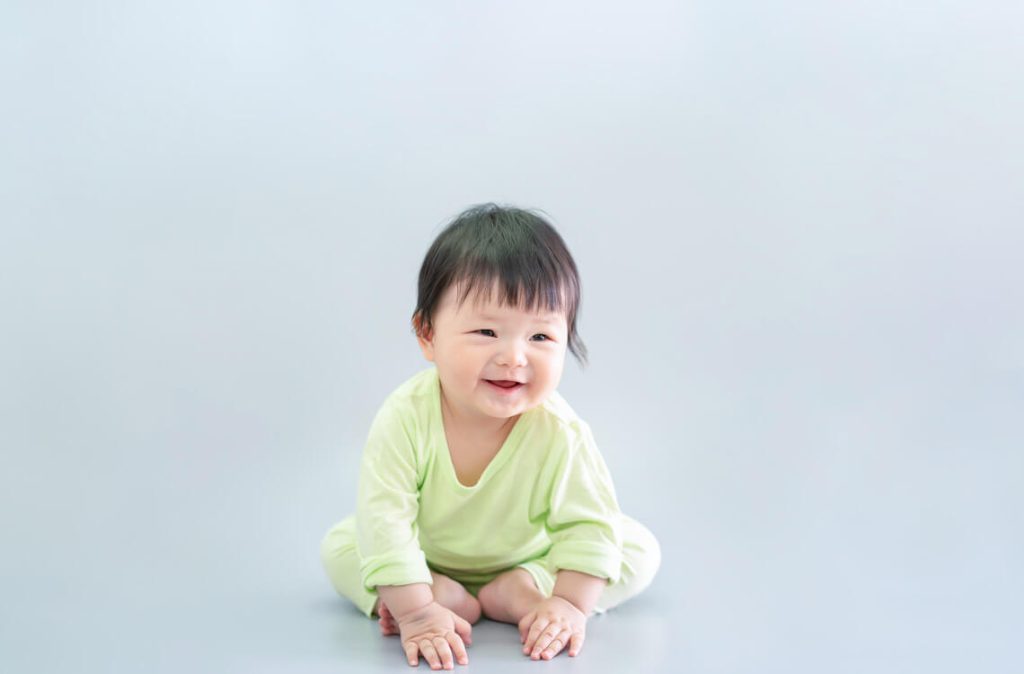A child’s 11-month-old developmental milestones are an exciting time.
Your little one is on the brink of toddlerhood. Each day brings new discoveries, surprising skills, and plenty of cheeky moments.
They’re edging closer to those first independent steps, becoming clearer in how they communicate, and showing you just how much personality they really have.
This is an age where routines shift again. Playtime grows more adventurous, eating becomes a little more independent, and your baby is eager to test boundaries while still looking to you for reassurance.
Let’s explore what you can expect with your little one’s 11-month-old developmental milestones.
Physical & Motor Milestones
Almost Walking
At 11 months, many babies are attempting their first wobbly steps. Some may already be walking short distances, while others may already be cruising confidently along furniture.
Standing unassisted for a few seconds is also common, showing off growing balance and leg strength.
Encourage this stage by offering safe spaces to practise. Push toys or holding your hands provide support without limiting independence.
Faster Crawling and Climbing
If walking hasn’t started, crawling often becomes faster and more coordinated. Babies love to chase after pets, siblings, or rolling toys.
Some will even start climbing—onto cushions, stairs, or low furniture—making constant supervision important.
This stage is as much about stamina as skill. Crawling races across rooms show just how determined your baby can be.
Communication & Cognitive Development
First Words and Expanding Babble
Many 11-month-olds are beginning to say their first clear words. “Mama”, “Dada”, or names for favourite objects often appear around now. Even if words are limited, babbling takes on the rhythm of real speech.
They’ll also use gestures like waving, pointing, or shaking their head “no”. Responding to these attempts encourages further language growth and shows them that communication matters.
Memory and Problem-Solving
Cognitive skills are blossoming. Babies start to remember where their favourite toys are kept and search for hidden objects during games.
They may try to solve simple problems, like working out how to push a button to hear a sound or stacking blocks to reach a toy.
Encouraging problem-solving through play boosts confidence and sharpens thinking skills.
Social & Emotional Development
Stronger Bonds and Separation Worries
Attachment remains strong at this age. Your baby may follow you from room to room or protest loudly when you leave.
Separation anxiety is normal and often peaks around now, showing a healthy bond.
Calm goodbyes and predictable routines help ease worries. Babies learn that while you leave, you always return.
Expressive Personalities
By 11 months, babies reveal more of their unique character. They might laugh at silly games, copy your actions, or even show frustration when they can’t get their way.
Their range of emotions widens, and they may attempt to comfort others by patting or offering a toy.
These moments are early signs of empathy and growing self-awareness.
Sensory & Perceptual Development
Exploring With Curiosity
Your baby uses all their senses to explore. They’ll bang objects together to test sound, shake toys to see what happens, and mouth items to learn about texture.
It’s important for you to be extra vigilant, especially when your baby starts reaching for small objects.
Recognition and Preferences
By now, babies clearly recognise family members, pets, and familiar spaces. They may become shy around strangers or clingy in new environments.
Strong likes and dislikes also emerge—favourite foods, toys, or songs often lead to big smiles, while disliked textures may be met with dramatic protests.
When to Talk to a Paediatrician
Every baby develops differently, but you may want to consult your paediatrician if your 11-month-old:
- shows little interest in moving independently (crawling, pulling up, or standing).
- does not attempt to babble or imitate sounds.
- fails to respond to their name or familiar voices.
- struggles to use hands effectively to grasp or release objects.
- appears unusually stiff, floppy, or withdrawn.
If you feel uneasy about any aspect of your baby’s 11-month-old developmental milestones, it’s always worth seeking professional advice.
Expert Tips & Daily Activities
Build Walking Confidence
Encourage standing and stepping with support. Games like rolling a ball a short distance away can motivate your baby to move.
Encourage Language Through Play
Talk about what you’re doing, name objects, and read simple books together. Songs with repetition and actions are especially engaging and help reinforce words.
Stimulate Problem-Solving
Offer toys with buttons, levers, or stacking challenges. Simple puzzles, like putting shapes into matching holes, keep curious minds busy.
Bond Through Interactive Games
Peekaboo, clapping games, and toy handovers help strengthen social bonds. You’re also teaching your baby important skills like turn-taking and responsiveness with these kinds of activities.
Embracing the Journey
Life with an 11-month-old is filled with laughter, surprises, and a touch of chaos.
Your baby is eagerly checking off their 11-month-old developmental milestones one by one.
Each step, sound, or smile is a reminder of just how quickly they’re growing.
With patience, encouragement, and a safe space to explore, you’re helping your little one prepare for the exciting leap into toddlerhood.
Disclaimer: The information provided in this article is for informational purposes only and should not be considered as medical advice from Motherhood. For any health-related concerns, it is advisable to consult with a qualified healthcare professional or medical practitioner.
For more insightful stories and fun recipes, stay tuned to Motherhood Story!
